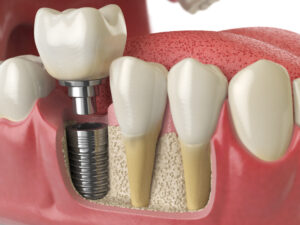 Bone grafting is often performed after tooth extractions to preserve the patient’s bone levels. Without bone grafting, a void can form in the extraction socket and complicate the process of replacing the missing tooth in the future.
Bone grafting is often performed after tooth extractions to preserve the patient’s bone levels. Without bone grafting, a void can form in the extraction socket and complicate the process of replacing the missing tooth in the future.
Many factors can impact bone grafting success. In this article, we’ll explore these factors and how they may affect your oral health.
Key Factors to Bone Grafting Success
Dental implants require a sound foundation of bone for integration. Bone grafting provides a higher quality and quantity of bone, enhancing the form and function of dental implants.
Some of the factors that affect the success of bone grafting include:
- Absence of infection
Infection is one of the main reasons for implant or bone graft failure. Make sure to follow your surgeon’s post-operative instructions to limit your risk of infection.
- Healing time
In most cases, it’s recommended to allow three to four months for the bone graft to heal and integrate with your native bone. If adequate healing time is not given, the bone grafting procedure may fail.
- Controlling systemic disease
Certain medical conditions, such as diabetes mellitus, may cause delayed healing after a bone graft. Controlling systemic diseases as advised by your physician is crucial to the success of your bone grafting procedure.
- Soft tissue closure
The surgeon will often stitch the bone graft site after the procedure. To ensure the success of the bone graft, avoid loosening the stitches with your tongue and closely follow your surgeon’s post-operative instructions.
- Refrain from smoking
Smoking can compromise healing and blood supply to the surgical site. Aim to quit smoking before the bone grafting procedure, or at least refrain from smoking for the recommended time period to maximize your healing potential.
If you’re considering dental implants to replace missing teeth, consider Dental Implant Solutionz. Our experienced surgeons offer a wide range of options to replace missing teeth. Reach out to us to schedule a consultation!
